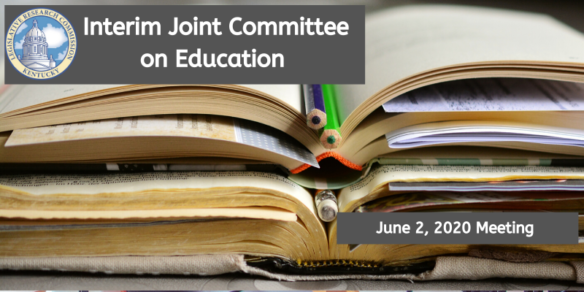
By Sky Carroll
sky.carroll@education.ky.gov
At its June 2 meeting, the Kentucky General Assembly’s Interim Joint Committee on Education heard concerns from superintendents about how to safely but efficiently return to in-person instruction in the fall amid the COVID-19 pandemic.
Greg Schultz, superintendent of Oldham County Schools, emphasized the importance of in-person instruction, but said trying to maintain social distancing in schools and classrooms would be “problematic, to say the least.”
“Public schools, which are a great part of our children’s lives, are going to have a hard time meeting these with any type of success,” Schultz said of the Kentucky Department for Public Health (DPH) guidelines for schools.
While Schultz acknowledged the effectiveness of non-traditional instruction (NTI), he noted the equity issues it presents for students who have different levels of technology and support at home.
“Some students did exceptionally well and some struggled,” he said, while praising teachers for the immense support they provided to students despite the difficulties of virtual instruction.
To try to keep the achievement gap from widening, Schultz said Oldham County schools will try to start educational intervention as early as June 15 so that gaps can be addressed prior to the start of the next school year.
“We’re going to follow the rules, but we’re also going to make sure there is flexibility for us to get through those days,” Schultz said of the Department for Public Health guidance for schools.
Rep. Regina Huff (R-Williamsburg) said she agreed “whole-heartedly” that changes to instruction need to be made before the return to school.
Some committee members expressed concerns about the emotional and mental health of students during the pandemic without the familiar environment of school or being able to see their friends.
Rep. Tina Bojanowski (D-Louisville), a teacher, said she has spent the past eight weeks engaging in NTI with her students, and while there was progress with some, about a third did not or could not participate. She said she recognized the challenges of NTI and the need for in-person instruction to ensure quality teaching.
Interim Kentucky Education Commissioner Kevin C. Brown and other KDE staff updated the committee on elementary and secondary education amid COVID-19, acknowledging the sudden challenges school districts were faced with by school closures.
Brown said KDE has developed a special page on the KDE website where districts, schools and parents can easily access information on COVID-19. KDE also began holding weekly webcasts with superintendents to quickly address issues and questions arising from the pandemic.
“As soon as we started down this road, we realized we needed to do a better job communicating with school districts,” he said.
Brown said that three words KDE has focused on throughout the COVID-19 crisis have been “educate, feed and support,” which are reflected in the guidance, information and material on the COVID-19 website. “The next phase is reopen,” he said.
Brown praised districts for quickly coming up with plans for feeding students with packaged meals while school is out. Over the past few months, food distribution has dramatically increased, and districts are now transitioning to summer feeding programs. While the feeding program has been a great success, Brown said packaged meals from feeding sites aren’t a substitute for the fresher food students receive while at school.
As for the return to school this fall, Brown said KDE meets weekly with the Department for Public Health but there are still a lot of unanswered questions.
Kelly Foster, KDE’s associate commissioner in the Office of Continuous Improvement and Support, gave a brief overview of the NTI effort during the pandemic. She and Brown praised Senate Bill 177, which gave school districts an unlimited number of NTI days.
Foster spoke about the many challenges for reopening schools in the fall, including how to maintain the health and safety of everyone in school buildings; maintain quality teaching and learning; and how to support exceptional learners, including gifted and talented students and students in need of special education services.
Each district will be required to submit a calendar to KDE by July 31. KDE has given districts the options of a traditional, early or late start, with flexibility on completing the required hours should there be a need to close schools again due to an increase in coronavirus cases this fall. Foster said most districts are planning to start at the traditional time of mid- to late August.
Although KDE has issued guidance for reopening schools, Brown said there currently are not answers to all of the questions district leaders are asking.
An update also was given on the search for a permanent education commissioner, with Brown – who is not seeking the position – saying it should be filled by the end of summer.
During a question and answer session at the end of the committee meeting, Sen. Max Wise (R-Campbellsville) said superintendents had expressed concerns about a lack of firm directives regarding reopening.
Brown said he believed there would be more certainty when the Kentucky Department for Public Health releases its guidance on how to safely reopen schools, which he believed would be issued soon.
Regarding the achievement gaps from NTI, Brown said that he expected to see it reflected in statewide testing. He said that some states are looking to see if MAP (Measures of Academic Progress) testing can serve as a substitute for the usual summative testing, such as K-PREP (Kentucky Performance Rating for Educational Progress). MAP is a computerized adaptive assessment program that provides educators with the information they need to improve teaching and learning.
Despite the challenges the COVID-19 pandemic brought to education, Brown praised the work of districts and teachers and how they implemented NTI during this unprecedented time.
He acknowledged that while it was not the same as being in a classroom, “districts did a phenomenal job.”
MORE INFO …
- Interim Joint Committee on Education
- Kentucky Department for Public Health’s COVID-19 webpage
- KDE’s COVID-19 webpage
- COVID-19 Hotline (800) 722-5725




Leave A Comment